PRASHANTHI DIARY
Chronicles of
Heaven on Earth
Education to Educare:
Conference of Eminent Educationists
Reconnect - MBA Alumni Meet
JULY 31st, 2005 : POST GRADUATE STUDENTS' DRAMA - SEVANJALI
On Sunday evening, the 31st of July, 2005, the students of the 1st year Post graduate classes of the Sri Sathya Sai Institute of Higher Learning, comprising of the MBA, MBA (Finance), M.Sc. and M.Tech. classes presented a programme on the theme of Seva entitled 'Sevanjali'. The well thought of and beautifully conceived drama, combining an eclectic mix of dance, songs, and the sharing of stories sought to bring to life the inner significance of the ideal of Seva and also how it has to be rendered, based on the teachings of Bhagavan. The boys used the medium of two well known stories - the story of Abou Ben Adhem and an incident from the life of Shirdi Sai Baba - to bring home their message to the crowd.

Abou Ben Adhem's story is a paean of service. He has been dedicating his life to the selfless service to the downtrodden and those in deep pain and suffering. One day, Abou comes across an angel who is writing the names of those who love the Lord. Abou is astonished to find that his name is not on the list. But later on, in a replay of a similar incident, Abou finds the same angel writing his name on the very top of the list of those whom God loves. This brings home the message that God loves those the best who selflessly serve others as a service to Him.
The Shirdi story depicted the incident wherein a rich but miserly merchant impatiently requests Brahmajnana, the divine knowledge, from Shirdi Baba. On one pretext or the other Baba keeps the merchant waiting while He tries to raise the sum of five rupees. The merchant sits through all these efforts impatiently, but is not willing to part with the Rs 5 though he has a handsome sum in his pocket, while clamouring for the Lord to bless him with priceless knowledge. Baba then chides him that it is only through sacrifice that one can attain immortality. How can one who cannot part with five rupees control the five indriyas (senses) and the five bhootas (elements)? Nature is the best example of selfless service. The river flows for the sake of others. The body too is verily for the sake of serving others.
The drama concluded with the song 'Deen Dukhiyon Se Prem Karo mera Sai Prasanna Hoga'. Bhagavan was very pleased with the presentation and spoke with a few participants after the presentation concluded.
AUGUST 1: A MUSIC PROGRAMME BY BALA VIKAS CHILDREN FROM USA
An orchestra choir of about 37 children (12 boys and 25 girls) and a sprinkling of 7-8 adults presented an enchanting evening of music in the divine presence. They were part of a group of 85 devotees who had come to bask in the divine presence from the North-East region of the United States (Region 1).
The orchestra of these bright eager kids, led by Ms Bitsy Noel (for whom Swami made a necklace at the end of the programme), had been practising for the past one year and praying to Swami with love and devotion for permission to perform at the Divine Lotus Feet. 
They had initially planned to present a bouquet of 14 songs to Swami, but Swami at the beginning asked the leader to sing only 13 songs. Ms Noel did not comprehend, so at the end of the 12th song, Swami stopped her and asked her to sing only one more song. 'Coincidentally', even the ring that Swami created for the pianist - Mr. Bob Becker, had 13 diamonds and also the original CD that Dr Wadhwani had presented to Swami in March 2005 (when he came to request the divine permission to perform at the Lotus Feet in August) contained only 13 songs.
Being intrigued by the story, I was very curious to see what the song was that had attracted such divine attention. The song which was dropped, was entitled "Namaste", spoke of the oneness of the God in all and was selected by the group to serve as a good-bye song to the Lord. Just goes to show that as far as the Lord is concerned there are no good-byes for He is always with us - guarding us, protecting us, wherever we are.
The 13 songs that they sang included "There is Only One Caste", "Alleluia", "Surrender To Sai", "Start The Day", "Love Eternally", "Chant The Name" and a few others. They ended the programme with a fine rendition of "When Dark Clouds Fill Your Skies Say His Name, See His Form, Hold On" that had the audience in tears.
AUG 2nd : A MUSIC PROGRAMME BY A GROUP FROM THE UNITED KINGDOM
400 UK devotees from areas such as Lancashire, Leicestershire, Wales, London and many other parts of the United Kingdom, came on 10-day Yatra (pilgrimage) to Puttaparthi from the 25th of July to the 4th of August by a chartered Boeing 747.

The choir group (of 30 boys and 25 girls) were dressed in their beautiful performance clothes: the sisters were in blue, pink and light yellow saris (to match the mandir colours) and the brothers were in white.
Swami blessed Sri Ajit Popat, the group leader to speak first, for as He endearingly put it - He had 'not heard him for a long time'. Sri Ajit Popat, in his address, highlighted how Swami brought together the children and youth, from various places of UK, for intense practice (as their Sadhana in their journey to God) and they wanted to offer it to Him, just to please Bhagavan and for nothing else!
The programme began with the Veda chanting of the Ganesh Prarthana and the Narayana Upanishad. This was followed by 3 solo short songs and a medley of instrumental music on the accordion by a blind girl, Ms Charlotte. The compassionate Lord noticed her condition and to give her comfort, Swami signalled for her to sit down for the performance. 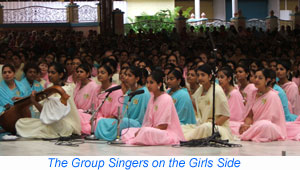
Then the group songs began. The hall was soon reverberating with the energising choir bhajans and cultural songs sung to a background accompaniment from the flute, the tabla, the dholak, electric drums, the mridangam, tambura, cymbals, the violin and the veena and of course, the essential harmonium.
The repertoire of group songs included "Brahmanandam", "Jai Jai Jai Gananayaka", "Chanda Kirana", "HariBhajana Bina", "Amba Shankari" and "Lokah Samasthah". There were also 2 solo songs - "Aisi lagi Lagan" by Vernu Navrathnam, and "Kurai Onrum Illai" by Laksha Satchinandam. Swami enjoyed the music and kept talam (rhythm) by tapping His hands on His thighs.
Aarti was performed by the music coordinators - brother Yoga and sister Hamsa, who had been instrumental in teaching the children and the youth the musical offering.

AUG 3rd : A QAWALI PROGRAMME BY THE U.K. GROUP
The UK group, in the evening prior to their departure, presented a programme entitled “Qawali Ki Shyam Sai Ke Naam” in Sai Kulwant Hall. The Qawali boys who were appropriately dressed in white pyjama-kurta and a green vest and cap lent colour and set the proper ambience for the musical fare to follow.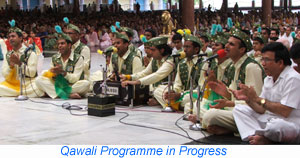
The programme began with a short Vedam chant. After this, a sister from the group recited the Azaan, and then continued with the Al-Fatiah. The Qawali programme then began with thunderous singing and Qawali clapping from the boys. The boys then sang 5 rousing Qawali songs - "Sai Ke Darbar Mein", "Yeh Chandi Ki Deewar…", "Sai Ke Pyaar Ki…", "Tere Dar Pe Jo Bhi Aayaa…", and finally "Tere Bina Suni Lage Zindagi". The group had also thoughtfully distributed the words to the songs so the audience could follow and sing along.
At the end of these songs, Swami blessed the group further by asking them to continue and sing bhajans. After another half an hour of bhajans, arathi was taken to bring to an end the day's programme.
AUG 5: STUDENT SPEECHES ON THE FIVE HUMAN VALUES
On August 5, unexpectedly, the afternoon devotee crowd was treated to a delightful fare in the guise of student speeches on the five human values.
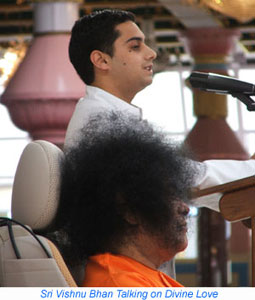 Dr. Deepak Anand, a student who has just completed his Ph.D. in Management, spoke first on the virtues of Sathya and Dharma - Truth and Right Conduct. Quoting extensively from the Gita, and from Swami's teachings on these two human values, Sri Deepak Anand said that the first and the last word of the Gita when juxtaposed together formed the word mama dharma or 'my code of right conduct' and acted as a primer for humanity.
Dr. Deepak Anand, a student who has just completed his Ph.D. in Management, spoke first on the virtues of Sathya and Dharma - Truth and Right Conduct. Quoting extensively from the Gita, and from Swami's teachings on these two human values, Sri Deepak Anand said that the first and the last word of the Gita when juxtaposed together formed the word mama dharma or 'my code of right conduct' and acted as a primer for humanity.
Sri Sai Giridhar, a second year M.Sc. student in Chemistry, spoke next on the virtues of Shanti and Ahimsa - peace and non-violence. He explained that Ahimsa can be realized only when you realize the suffering of others as your own. He stressed that the words - "I want peace" can be experienced only when the 'I' (ego) and the 'want' (desire) are dropped to leave behind peace. He also spoke on Loka Samastha Sukhino Bhavantu - 'May all the beings in all the worlds be happy.'
Sri Vishnu Bhan spoke last on the virtue of Love - Prema. He started off saying that love can only be experienced. Like a mango it has to be eaten and enjoyed to know how it really tastes. He also related the story of the emperor Akbar and his minister Birbal, wherein Akbar had asked Birbal why Avatars themselves descended on earth, instead of sending a messenger. Deferring to answer the question later, Birbal threw a decoy mannikin similar to Akbar's son in the water when Akbar was once out boating. To save his 'son', the emperor immediately dived into the water, even though he could have easily deputed one of his servants to save his son. Similarly, said Sri Vishnu Bhan, Baba's love has forced Him to jump into the ocean of samsara to save us. He also said that the best examples of Baba's love are His service projects.
AUG 12: CELEBRATION OF VARALAKSHMI PUJA IN SAI KULWANT HALL
THE MORNING PROGRAMME OF PUJA AND WORSHIP
In August 2000, speaking about the VaralakshmiPuja (Prayer) in Sai Kulwant Hall, Swami said,
| |
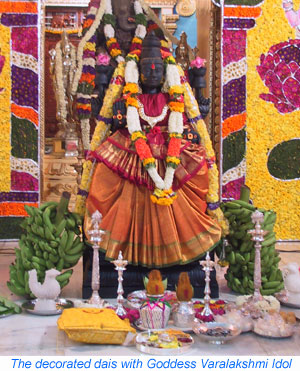 |
"Since ancient times, the women of Bharat have upheld the dignity and honour of the family and the community at large. The worship of goddess Varalakshmi earned them Her grace and they could accomplish all this. Varalakshmi is one who grants all the boons that women pray for. She confers on women all the eight types of wealth. Worship of Varalakshmi confers wealth, prosperity and bliss. But due to the effect of modern age, people do not adhere to such sacred practices. That is why their houses lack purity and sacredness.
Legend has it that Parvati once asked Easwara if there was any way to ensure auspiciousness, prosperity and well-being of the women. She desired that every woman should lead a long, happy and healthy life with her husband, children, grandchildren, friends and relatives. Easwara was pleased with Parvati’s prayer and told her about the Varalakshmi Vrata, which would confer all a woman may ask for. This particular Vrata is a boon for all women.
Easwara revealed the sacred Varalakshmi Vrata to Parvati, so that the future generations might perform this Vrata and derive the benefits therefrom. The Purohit (chief priest) has enumerated the benefits which this Vrata confers. When a woman performs the Varalakshmi Vrata, she gets the blessings that she may live long with plenty and prosperity as a sumangali (a woman whose husband is alive) with her children and grandchildren. Varalakshmi protects seven past generations and seven future generations. Noble women like Savitri and Anasuya enjoyed peace and prosperity by performing this sacred Vrata. The purpose of Varalakshmi Vrata is to atone your sins, develop sacredness and ultimately lead you to Divinity."
|
Five years later, on August 12, 2005, another grand Varalakshmi Puja was performed in the divine presence in which 948 married women participated. They were of all ages, from all walks of life, drawn mostly from the different districts of Andhra Pradesh and the ashram residents. There were also a few from diverse parts of the country, even from places as far off as Mumbai and Kolkata and some were even from abroad. But all had one single purpose in mind - to perform the sacred Varalakshmi Vrata with full feeling and devotion for the well-being of their husbands and families.
The whole of Sai Kulwant Hall was beautifully decorated for this auspicious and holy occasion. The centrepiece of the action was the beautiful dais in Sai Kulwant Hall wherein floral decorations adorned the façade of Sai Kulwant Hall. Portraits of Goddess Lakshmi done with different hued flower petals hung one each on both ends of the dais. In the centre of the stage was placed a Lakshmi carved out of black stone by specially trained sculptors from Mahabalipuram in Tamilnadu. The statue was specially commissioned for the occasion and made in strict accordance to Vedic injunctions.
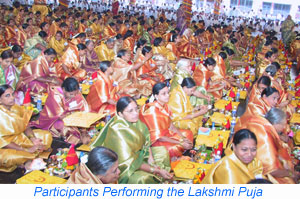
All the women were seated in rows in front of the dais with a plate in front with all the necessary ingredients for the Puja. The ladies were all dressed alike in a gold-hued sari and the entire hall had a festive and august ambience that provided the right setting for the conduct of this sacred ritual.
After Swami arrived at the Hall to the sounds of Veda chanting and had taken His seat on the dais, He blessed the priest to start the proceedings. The priest began with a brief introductory talk in Telugu conveying gratitude to Swami at the chance for doing this Puja. He then led all the women in the conduct of this ritualistic worship that lasted for approximately 45 minutes. At the conclusion of the ritual the priest also related the story of the origin of this Puja for the benefit of the participants.
After this, Swami personally went around the entire hall and blessed all the excited participants with the grace of His close Darshan. He went around the whole hall for a full ten minutes, blessing everyone, even those seated at the far end of the Hall. He then blessed the priests and their wives with clothes, after which the arati brought the morning's programme to a close.
THE AFTERNOON PROGRAMME OF A CARNATIC VOCAL CONCERT BY MS. NITYASHREE MAHADEVAN
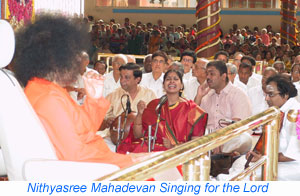 In the afternoon, we were regaled with devotionals by Smt. Nithyashree Mahadevan, the eminent vocalist and one of the most popular Carnatic vocalists today. She is the granddaughter of D.K. Pattammal and Palaghat Mani Iyer, who were both singing phenomena - Sangita Kalanidhis. Nityashree is a disciple of Smt Lalitha Sivakumar, herself a talented artiste and the teacher of many eminent musicians. In the afternoon, we were regaled with devotionals by Smt. Nithyashree Mahadevan, the eminent vocalist and one of the most popular Carnatic vocalists today. She is the granddaughter of D.K. Pattammal and Palaghat Mani Iyer, who were both singing phenomena - Sangita Kalanidhis. Nityashree is a disciple of Smt Lalitha Sivakumar, herself a talented artiste and the teacher of many eminent musicians.
She was accompanied by Sri Parur M.A. Krishnaswamy on the violin, Sri Umayalpuram V. Kalyanaraman on the mridangam, and Sri S. Srisailam on the ghatam. They provided able and understated accompaniment that suitably complemented Smt Nityashree's full throated style of singing that she was able to hold for her entire concert. She ended the concert with her rendition of the Meera bhajan, "Payo ji maine, Ram rathan dhan payo ." Swami gifted her a medallion and talked with her for a few minutes after the concert.

|
AUG 14: A DRAMA BY THE SRI SATHYA SAI HIGH SCHOOL STUDENTS - BLOSSOMS OF LOVE
The High School students presented a cultural programme in the Divine Presence to highlight a basic moral teaching that is necessary for the uplift of society:
Mathro Devo Bhava, Pitro Devo Bhavah;
Acharya Devo Bahvah, Atithi Devo Bhavah
Respect your mother, father, teacher and
the guest as the very embodiment of God.
The theme unfolds through Akash, a misguided youngster, who has no time for his parents or teachers. His friend (a Sai student) decides to transform him by unfolding for him the saga of Bharatiya (Indian) culture and its heroes.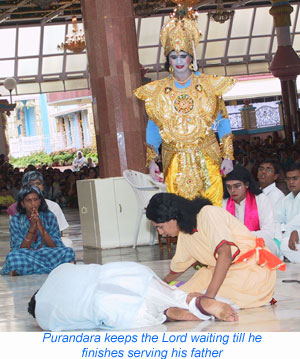
The first story is that of Pundarika, who continues to serve his father even though the Lord Himself is waiting at the doorstep, thus pleasing the Lord for his exemplary devotion towards his father.
Continuing in this vein, the next story is that of Aruni who saves his master's field from flooding by plugging the breach in the embankment (due to torrential rains) with his bare body, enduring the biting chilliness of the water with his bare body for his guru's sake.
The final story is that of a poor cobbler whom God promises to visit the next day. On the way to work however, the cobbler gives away his breakfast to a hungry sweeper and also the coat he owns to a sick old man. When he is finally ready to eat his only meal of the day, a hungry woman begs for alms and he gives her all the little food that he has and goes hungry himself. Lord Jesus is pleased over his selfless service and blesses him.
As a fitting tribute to Swami, who is the genesis of all social transformation in this Kali age, the grand finale highlights the multi dimensional projects of our Lord Sai - free education, free medication, free water and the Grama Seva.
In the last scene all the students pray to Bhagavan, "Sai, we need You; we love You; You are our life and goal; without You we are nothing." When a couple of boys went forward to seek His blessings, He said, "It was very nice. Very happy". Sweet words that brightened all their faces and more than compensated for their toil, hard work and sleepless nights!
AUG 15th: INDEPENDENCE DAY DRAMA BY THE 2ND YEAR POST GRADUATE STUDENTS ENTITLED SWAARAJYA
 This Independence Day drama was centered on Bhagavan's concept of moving towards SWAARAJYA from SWARAJ. The drama began with a dance along with a song on India and the entry of the personification of the Spirit of India. The period is the pre-independence era. The Spirit of India laments about the British rule that has enslaved India and he ends with a question: "Will there be no awakening in this land?"
This Independence Day drama was centered on Bhagavan's concept of moving towards SWAARAJYA from SWARAJ. The drama began with a dance along with a song on India and the entry of the personification of the Spirit of India. The period is the pre-independence era. The Spirit of India laments about the British rule that has enslaved India and he ends with a question: "Will there be no awakening in this land?"
Moving on to the Revolt of 1857, the drama movingly portrays the sacrifice of Alluri Sitaram Kesari, the conviction of Mahatma Gandhi to the use of non-violence, Netaji Subash Chandra Bose's call to the nation and Jatin Das' fast unto death. The common man's contribution was also portrayed including that of a blind boy who despite his limitation yearned to fight for the freedom of his motherland.
The first half of the drama which was portrayed as a documentary that a journalist has made concludes with the celebrations on Independence Day on Aug 15, 1947. The journalist's boss feels that the documentary would be incomplete without portraying the present.
The residents of a house in a village, from which the journalist wants to start his story, offer him food despite not having anything to eat for themselves. Thus the journalist comes face to face with the most grotesque form of slavery - poverty.
The journalist then begins to question the Spirit of India about the relevance of Independence when the motherland is still under the shackles of poverty, corruption etc. The spirit replies that the root cause of such evils is kama , krodha, lobha, moha, mada, and matsalya (lust, anger, greed, attachment, ego, and jealousy). The only way to break these shackles is to make each of our lives a prayer at the Feet of the Lord, a prayer to free our hearts from lowly desires and aspire for the truth and freedom of the soul.
When every child of India aspires for the freedom of the soul, then India herself will attain her full destiny, she will realize her dream - a dream to move from SWARAJ - self-rule to SWAARAJYA - the rule of the Self.
AUG 17 & 18: AN INTERNATIONAL CONFERENCE - "EDUCATION FOR THE 21st CENTURY- EDUCATION TO EDUCARE"
Aug 17 Events - The Conference Inauguration in the Morning and a Drama Staged In the Afternoon
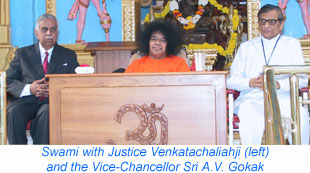 The morning of August 17th saw a gathering of eminent educationists in Sai Kulwant Hall for a conference to discuss the future requirements and roadmap for education in the 21st century - evolving from education to educare. The conference was organised by the Sri Sathya Sai Institute of Higher Learning and the students from all the 3 campuses had come to Prashanti Nilayam for these 2 days. The morning of August 17th saw a gathering of eminent educationists in Sai Kulwant Hall for a conference to discuss the future requirements and roadmap for education in the 21st century - evolving from education to educare. The conference was organised by the Sri Sathya Sai Institute of Higher Learning and the students from all the 3 campuses had come to Prashanti Nilayam for these 2 days.
The inauguration of the conference commenced in the morning of the 17th with Sri Anil V. Gokak, Vice-Chancellor, Sri Sathya Sai Institute of Higher Learning, welcoming the delegates and Hon. Justice M.N.Venkatachaliah, the Chief Guest of the conference. In his opening address, Sri Gokak set the tone for the conference. Stating that the educational needs for the 21st century concern responding to the challenges of globalisation and playing a proactive role with a clear vision of the society we would like to live in.
Speaking next, Justice Venkatachaliah (a well renowned figure in Indian judicial circles, having held several key positions including the Chief Justice of India, Chairman of the National Human Rights Commission, and Chairman of the Constitution Review Committee), called the 20th century the bloodiest one in human history. Outlining the problems facing society, the learned justice said that overcoming the dehumanising effects of technology and ushering in a new human civilization based on compassion and human values is a need that only educare can satisfy. Terming Prashanti Nilayam as an appropriate venue for a conference on educare, he said that it is here that the greatest experiment in love, service and compassion is underway.
Swami, in His divine discourse, said that we should enquire into the true purpose of education. One may study a number of books and master various branches of knowledge, but does one enjoy peace and tranquility? All the knowledge that we acquire from books can only take care of our physical needs. People think that education confers on them respect and esteem. But, people lack true wisdom in spite of their high academic achievements.
In modern times parents want their children to pursue solely job-oriented education. But, what is the use of such education which does not bring about transformation among children?
Love is the essence of education. Bereft of love, education is artificial. Therefore, develop love in the first instance. Understand that the indweller is the same though bodies are different. Hold on to this fundamental principle and experience Ananda (bliss), concluded Swami.
After Swami's discourse, the conference attendees dispersed to the Administration Block of the Institute to carry on their deliberations.
 In the afternoon, everyone re-assembled in Sai Kulwant Hall, whereupon two students presented the summaries of the deliberations of the morning session for the benefit of all. In the afternoon, everyone re-assembled in Sai Kulwant Hall, whereupon two students presented the summaries of the deliberations of the morning session for the benefit of all.
Following a reading of the summaries, there was a drama by the first year post-graduate students of the Institute, entitled ‘There Is Only One Caste, the Caste of Humanity. There Is Only One Religion, the Religion of Love’. Tackling a nebulous theme very creatively, the drama briefly depicted the origin, teachings and beliefs of the major religions of the world and how each one of them was designed by God for the uplift of mankind, dictated by the specific time, culture and location. Explaining in turn the essence of the 5 major religions of the world as depicted in the Sarva Dharma symbol, they brought out that though they may vary in their external rituals and observances, the underlying teachings are catholic in nature. This concept was highlighted very lucidly in a scene where four salesmen are promoting the same product – coloured candles. Although all the candles give the same light, each one was packaged differently and each salesman proclaimed his product to be the best and promoted his product in his unique way.
AUG 18 EVENTS: The Valedictory Function Of The Conference
The next day, after the morning Darshan the participants again adjourned to the Institute Administrative Block to continue their deliberations.
In the afternoon, everyone assembled in the Sai Kulwant Hall to attend the Valedictory ceremony of the conference. Sri Sanjay Sahni, Principal of the Brindavan campus, welcomed the Chief Guest for the function, Mrs. Kumud Bansal, Secretary, Primary & Secondary Education, Government of India. He also introduced the speakers for the valedictory session of the conference that afternoon.
The first two speakers were students from the Postgraduate classes, who read out the summaries of the day’s proceedings of the conference.
Following the summaries, there were speeches by 2 students - Sri Sanjay Mahalingam, a Research Scholar from the School of Management, and Sri Jagadish Chandra, who is currently pursuing his M.Phil (Physics) in Bio-Optics. Both the students focused on how the Institute instilled character and human values in the students, without sacrificing any secular education. They provided numerous anecdotes and stories to illustrate not only how the Institute students became successful in their worldly life, but also by their noble conduct and integrity earned a good name for the Institute. Sri Sanjay Mahalingam forcefully noted that Swami's boys are hence not just capable of bhajans and bhojan, but are capable of extraordinary achievements. Sri Jagadishchandra said that it is the greatest fortune of students to acquire Bhagavan as their Master, for He with His selfless Love constantly moulds the students to become better human beings and ultimately grants them the priceless gift of the Vision of the Self.
Sri S.V.Giri, former Vice-Chancellor of the Sri Sathya Sai Institute of Higher Learning, spoke on the uniqueness of the education system established by Bhagavan, which has been named by Him as ‘Educare’. He said that the university orients the students towards social welfare and that education should never be removed from the context of society and its betterment. He further went on to say that the remarkable achievements of Bhagavan’s educational system have to be replicated to benefit all humanity, and the Institute of Sathya Sai Education in Thailand and the Sathya Sai School in Zambia have proved that it is indeed possible even without Bhagavan being physically present, as His Grace and Compassion are not bound by the spatial limitations.
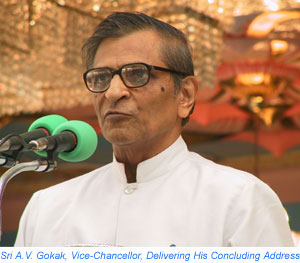 Smt. Kumud Bansal, Secretary to the Government of India, Dept. of Elementary Education and Literacy, speaking next, paid compliments to the students of the SSSIHL who impressed her much during her short stay here. She observed that while discipline problems in the country’s schools are not too many, the same cannot be said of the colleges and universities. The educational institutions run by Bhagavan stand out because of the high calibre and conduct of the students of His university and prayed for His continued guidance and blessings. She also noted that 40% of the country's citizens are below 20 years of age and they have to be nurtured well to lead the country to a bright future. Smt. Kumud Bansal, Secretary to the Government of India, Dept. of Elementary Education and Literacy, speaking next, paid compliments to the students of the SSSIHL who impressed her much during her short stay here. She observed that while discipline problems in the country’s schools are not too many, the same cannot be said of the colleges and universities. The educational institutions run by Bhagavan stand out because of the high calibre and conduct of the students of His university and prayed for His continued guidance and blessings. She also noted that 40% of the country's citizens are below 20 years of age and they have to be nurtured well to lead the country to a bright future.
The Vice-Chancellor of the Institute, Sri A.V. Gokak then presented his concluding remarks wherein he summarised for the benefit of all the deliberations of the conference. Sri Gokak said that the first and foremost challenge is change at a bewildering rate. There is lopsided growth due to enhanced emphasis on intelligence and science without adequate emphasis on spiritual content. The conference also concluded that the system of education must extend beyond the school and college, with the student having a clear vision of his role in society.
The system of education must provide for a balanced development of body, mind and soul and stimulate the student towards lifelong learning. Touching upon the nature of the curriculum to precipitate such a change, Sri Gokak said there must be a proper harmony among different subjects with humanity having as much importance as science. Speaking on the role of the teacher, Sri Gokak stressed that he should not play a mere mechanical role, but has to transform the student. He has to first transform himself and then recreate the experience in his students.
Human Values have a crucial role to play in the education system, and even science subjects must have a human values component. He said that all the major religions lead to the same five human values. In conclusion, he said that once we imbibe educare, harmonious relations will prevail within the individual, between individuals and nature and the world.
This brought the curtain down on a truly enlightening conference that not only highlighted the problems faced by the modern day education system but also held out a ready solution in the form of the human values based approach adopted in Bhagavan’s schools and colleges.

|
AUG 20-21: 'RECONNECT' - MANAGEMENT ALUMNI MEET
 It was an emotional trip down memory lane for the former students of the School of Business Management, Accounting and Finance, Sri Sathya Sai Institute of Higher Learning, Prasanthi Nilayam, when they gathered at the Lotus Feet of their beloved Swami on the 20th and 21st of August for their Alumni Meet aptly named ‘Reconnect’. This meet was organized on the occasion of the eve of the 20th anniversary of the department coinciding with the 80th year of the Advent of Bhagawan. [In the Aug issue of H2H, we had a cover story on the School of Business Management to coincide with the month of the meet, if you missed reading it, go here now.]
It was an emotional trip down memory lane for the former students of the School of Business Management, Accounting and Finance, Sri Sathya Sai Institute of Higher Learning, Prasanthi Nilayam, when they gathered at the Lotus Feet of their beloved Swami on the 20th and 21st of August for their Alumni Meet aptly named ‘Reconnect’. This meet was organized on the occasion of the eve of the 20th anniversary of the department coinciding with the 80th year of the Advent of Bhagawan. [In the Aug issue of H2H, we had a cover story on the School of Business Management to coincide with the month of the meet, if you missed reading it, go here now.]
If you have read the cover story of the August issue, you will know how ever since the School of Business Management, Accounting and Finance, offering MBA (Master of Business Administration), was started on 21st August, 1986, Bhagavan took a keen interest in fostering the business leaders of the future into change agents who would spread His message of values into the corporate world. For many years after the inception of the department, Bhagavan would visit the Institute every week to deliver talks on management to the students. It was during these talks that Bhagavan succinctly summarized the science of management as ‘Man Management’. This concept is only now catching on in business thought, but Bhagavan had already identified it as the key to successful management more than a decade ago. It was to offer their gratitude to Bhagavan for all the care and attention He had showered on them during their stay as students that more than 450 members of the alumni from all over the world gathered at Prashanti Nilayam to bask yet again in the sunshine of His Love and thus ‘reconnect’ and ‘recharge’ themselves.
 On the evening of 20th, around 3.00 p.m. Swami arrived into the Kulwant Hall. He took a full round and to everybody’s surprise, the car drove out of the Mandir! Guess where?…..Right into the stadium towards the Shanti Vedika. That is where a real big team consisting of all the hostel teachers and the I Year Post Graduate students were making mega arrangements for the evening dinner.
On the evening of 20th, around 3.00 p.m. Swami arrived into the Kulwant Hall. He took a full round and to everybody’s surprise, the car drove out of the Mandir! Guess where?…..Right into the stadium towards the Shanti Vedika. That is where a real big team consisting of all the hostel teachers and the I Year Post Graduate students were making mega arrangements for the evening dinner.
Swami went towards the gallery. By then two faculty members, Dr. Naren Ramji and Prof. Sudhir Bhaskar had reached the spot and upon being asked by Swami, they mentioned that the Business Management Faculty were sponsoring a special dinner for all the alumni, current students and Institute Staff. Swami smiled and blessed the programme. A totally unexpected act of Grace! And the dinner session, every alumni would agree was an unforgettable experience!
Swami returned from the stadium in half an hour and after He came onto the stage, Sri A.V. Gokak, Vice-Chancellor of the Institute, gave the welcome address. He was followed by Sudhindran, an alumnus, who outlined the purpose of the Meet and expressed immense gratitude to Bhagavan on behalf of all the alumni. Brother Sanjay Mahalingam, a current research scholar at the School, then performed the Master of Ceremonies.
 Swami then very graciously blessed their card, their Souvenir ‘Fragrance’ – consisting of 80 articles written by alumni members of the Business School, an interactive VCD, consisting of the theme song with a video, clippings of several interactions of Swami with Management students over the years and other Hostel Life video clippings. Another special item that Swami blessed, was the colourful Brochure about the School of Business Management.
Swami then very graciously blessed their card, their Souvenir ‘Fragrance’ – consisting of 80 articles written by alumni members of the Business School, an interactive VCD, consisting of the theme song with a video, clippings of several interactions of Swami with Management students over the years and other Hostel Life video clippings. Another special item that Swami blessed, was the colourful Brochure about the School of Business Management.
And then there was the Toolkit distribution. The alumni had arranged for distribution of comprehensive toolkits and uniforms to 80 needy youth trained as electricians, carpenters and plumbers belonging to villages surrounding Prashanti Nilayam. Though possessing the necessary skills these men continued to remain unemployed as they did not have the wherewithal to procure the necessary tools. But, now Bhagavan has gifted them not merely toolkits but also the means to live a life of dignity.
Following this, there was a panel discussion on “Man Management – Relevance of Values in the Business World” moderated by Sri Krishnamurthy, an alumnus. Seven members of the alumni spanning various sectors of the industry and occupying senior positions in their respective organizations participated in the discussion that focused on how Bhagavan’s teachings helped them to deal with the pressures and difficult situations that arise in corporate life, drawing on their own experiences and insights. The discussion was supplemented with several personal illustrations and proved very enlightening.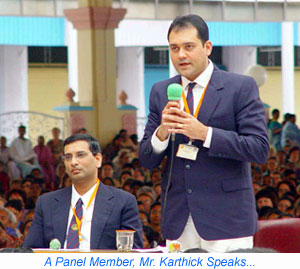
One very significant point that emerged during the discussion was how one can reconcile the pursuit of corporate excellence with spirituality. Sri Karthik Shenoi, CEO, iCap Solutions Pvt. Ltd., illustrated how this reconciliation can be achieved by recalling an allegory given by Bhagavan. Bhagavan compares the pursuit of worldly goals to the attempt to get the coconuts on a coconut tree by running up the shadow of the tree on the ground – a fruitless enterprise. But, when one actually climbs up the coconut tree, one’s shadow is also seen climbing the tree.
What this analogy reveals to us, is that according highest priority to spiritual goals is not necessarily divergent with life in the material world. In fact, worldly success is added on to us as a matter of course on the spiritual path. Speaking about the means of dealing with stress, the panelists concluded that stress arises whenever self-interest dominates one’s thinking. But, when we follow Bhagavan’s teaching that the feeling of ‘We’ must be placed above the ‘I’ feeling, one is not affected by stressful situations.

Another member said that one must follow the principle of 100% commitment and 0% attachment, leaving the burden of victory or defeat to the Lord. Stress, they said stood for 'Sai To the Rescue in Every Sticky Situation'. Teamwork, which is an important quality that every employer looks for, is something that students of Bhagavan do not learn merely in theory but it comes to the fore during the Annual Sports and Cultural Meet and the community service programmes, which are regular and integral parts of the education at Bhagavan’s university. The discussion thus showcased how spirituality can be integrated into our daily life to make it more meaningful and enriching.
Swami, who was very keenly listening to the panellists, smiled and looked very pleased after the discussion ended. But He did not stop at that. Swami asked for cool fruit juices to be served to all the panellists right there in Kulwant Hall and even called all the seven for a special interaction in the interview room. It was such a moving experience! It was the overwhelming motherly love of the beloved lord who was very thrilled seeing them after a long time and immensely pleased with their performance.
On the morning of 21st, after an introductory talk by Sri Subash Subramanian, an MBA alumnus and currently a Research Scholar in the School of Business Management, Accounting and Finance, there were talks by two alumni. 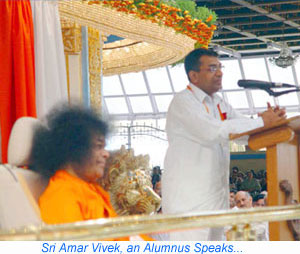
The first speaker, Sri Amar Vivek, is a practicing lawyer in the High Court of Punjab and Haryana and also at the Supreme Court of India. He belongs to the first batch of MBA students from Bhagavan’s university. He has been engaged in many rural service projects most notably, the Sri Sathya Sai Grameen Jagruthi programme under which a hospital, a school, a vocational training center and a sports school are being run for the benefit of the rural poor completely free of charge. His service programmes have earned him recognition from the Government of India and he was conferred the National Youth Award. He narrated how Bhagavan had personally guided him in setting up and managing these service projects, His unseen Hand helping him ford over obstacles on the way. He also narrated two instances where by standing up to his principles he managed, by Bhagavan’s grace, to turn two seemingly impossible situations in his favour.
Sri Ashok Sundaresan, who spoke next, is a Chartered Accountant by profession, and an active member of the Youth wing of the Sri Sathya Sai Seva Organization, Tamil Nadu. He said that being a student of Bhagavan is a privilege and opportunity and also a great responsibility. To emphasize the good fortune of students in being contemporaries of Bhagavan, he narrated an experience of late Prof N.Kasturi wherein, from the first floor, Sri Kasturi sees luminous beings in the place where the students sit and Swami communicating to them with His eyes. This, Bhagavan revealed to Kasturi, was how the entire creation was being managed. He also recalled a moving incident wherein a poor family from Mahabubnagar Dist. of Andhra Pradesh traveled to Chennai when the construction of the Chennai Water project was going on, to contribute in the form of physical labour to the project. This was to express gratitude to Swami for the water project in Mahabubnagar.
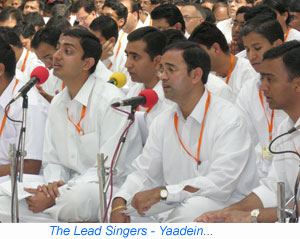 After the talks, there was a programme entitled ‘Yaadein’ by the alumni. It was a musical programme interspersed with sharing of experiences by alumni members. which was anchored by brother Shaurya Sinh. Each song was a success and the experiences too were touching. The theme song ‘Yadein’ was the icing on the cake.
After the talks, there was a programme entitled ‘Yaadein’ by the alumni. It was a musical programme interspersed with sharing of experiences by alumni members. which was anchored by brother Shaurya Sinh. Each song was a success and the experiences too were touching. The theme song ‘Yadein’ was the icing on the cake.
At the end of the programme, everyone realized that though they may have left the portals of the Institute, they can never leave Swami nor can Swami ever leave them; Swami was always with them and their bond with Him was eternal and heart to heart.
After the Mandir session, the alumni assembled in the Institute auditorium at 10.00 a.m. for an interaction with the faculty members. At 10.30 a.m., the session began with an introductory talk by the current Dean of the School of Business Management, Prof. U.S. Rao. He was followed by Prof. V.E. Ramamurthy speaking about the purpose of the meet. Then came Prof. Sehgal the former and the first Dean of the School followed by Sri Hari an alumnus of the Institute who gave an overview of the Alumni Website being designed by a technical team. This was followed by two talks – one by brother Dhruv Sachdev an alumnus of the first batch of MBA and the other by brother B. Karthik – an alumnus of the first batch of MFM students. Both made a very good presentation.
Then came the most appreciated presentation by the most sought after person –  Sri V.Y.C.S. Vijay – the central coordinator of the Alumni Meet. He was indeed the backbone of this entire Meet. He was very aptly welcomed onto the stage by a standing applause by all the alumni members. Vijay very briefly spoke about the organising of Reconnect. Dr. Naren Ramji followed him, delivering the vote of thanks and expressing gratitude to all the groups and teams that worked so seamlessly, with dedication and commitment to make the Meet a success.
Sri V.Y.C.S. Vijay – the central coordinator of the Alumni Meet. He was indeed the backbone of this entire Meet. He was very aptly welcomed onto the stage by a standing applause by all the alumni members. Vijay very briefly spoke about the organising of Reconnect. Dr. Naren Ramji followed him, delivering the vote of thanks and expressing gratitude to all the groups and teams that worked so seamlessly, with dedication and commitment to make the Meet a success.
In the afternoon, the management students of the Institute presented a drama entitled, “Karishye Vachanam Tava” meaning, “Command, and I shall obey!” The drama depicted how two young management graduates who had recently joined Navajivan Pharma Co. face many difficulties and disappointments due to the unethical behaviour of a manager, how they overcome these difficulties, and become instrumental in guiding the company to make decisions that go beyond just financial criteria and contribute to the welfare of the society. The drama addressed many issues and ethical dilemmas that face the managers of today’s corporate world and how they should be dealt with by discrimination and a clear conscience.
After the drama, Bhagavan granted photos to the participants. Bhagavan also blessed and launched the website of the Institute – www.sssihl.org . The programme concluded with arati and Bhagavan retired to His residence.
It has been quite an eventful month and the one to come promises to be even more lively for we will be celebrating the Krishna Janmastami, Ganesh Chaturthi and the Onam festivals. Look forward to our reports on all these and more next month.
Till that time we pray for Swami's blessings for you and your family. Sai Ram!
- H2H Team










 Dr. Deepak Anand, a student who has just completed his Ph.D. in Management, spoke first on the virtues of Sathya and Dharma - Truth and Right Conduct. Quoting extensively from the Gita, and from Swami's teachings on these two human values, Sri Deepak Anand said that the first and the last word of the Gita when juxtaposed together formed the word mama dharma or 'my code of right conduct' and acted as a primer for humanity.
Dr. Deepak Anand, a student who has just completed his Ph.D. in Management, spoke first on the virtues of Sathya and Dharma - Truth and Right Conduct. Quoting extensively from the Gita, and from Swami's teachings on these two human values, Sri Deepak Anand said that the first and the last word of the Gita when juxtaposed together formed the word mama dharma or 'my code of right conduct' and acted as a primer for humanity.

 In the afternoon, we were regaled with devotionals by Smt. Nithyashree Mahadevan, the eminent vocalist and one of the most popular Carnatic vocalists today. She is the granddaughter of D.K. Pattammal and Palaghat Mani Iyer, who were both singing phenomena - Sangita Kalanidhis. Nityashree is a disciple of Smt Lalitha Sivakumar, herself a talented artiste and the teacher of many eminent musicians.
In the afternoon, we were regaled with devotionals by Smt. Nithyashree Mahadevan, the eminent vocalist and one of the most popular Carnatic vocalists today. She is the granddaughter of D.K. Pattammal and Palaghat Mani Iyer, who were both singing phenomena - Sangita Kalanidhis. Nityashree is a disciple of Smt Lalitha Sivakumar, herself a talented artiste and the teacher of many eminent musicians.
 This Independence Day drama was centered on Bhagavan's concept of moving towards SWAARAJYA from SWARAJ. The drama began with a dance along with a song on India and the entry of the personification of the Spirit of India. The period is the pre-independence era. The Spirit of India laments about the British rule that has enslaved India and he ends with a question: "Will there be no awakening in this land?"
This Independence Day drama was centered on Bhagavan's concept of moving towards SWAARAJYA from SWARAJ. The drama began with a dance along with a song on India and the entry of the personification of the Spirit of India. The period is the pre-independence era. The Spirit of India laments about the British rule that has enslaved India and he ends with a question: "Will there be no awakening in this land?"
 The morning of August 17th saw a gathering of eminent educationists in Sai Kulwant Hall for a conference to discuss the future requirements and roadmap for education in the 21st century - evolving from education to educare. The conference was organised by the Sri Sathya Sai Institute of Higher Learning and the students from all the 3 campuses had come to Prashanti Nilayam for these 2 days.
The morning of August 17th saw a gathering of eminent educationists in Sai Kulwant Hall for a conference to discuss the future requirements and roadmap for education in the 21st century - evolving from education to educare. The conference was organised by the Sri Sathya Sai Institute of Higher Learning and the students from all the 3 campuses had come to Prashanti Nilayam for these 2 days. In the afternoon, everyone re-assembled in Sai Kulwant Hall, whereupon two students presented the summaries of the deliberations of the morning session for the benefit of all.
In the afternoon, everyone re-assembled in Sai Kulwant Hall, whereupon two students presented the summaries of the deliberations of the morning session for the benefit of all.  Smt. Kumud Bansal, Secretary to the Government of India, Dept. of Elementary Education and Literacy, speaking next, paid compliments to the students of the SSSIHL who impressed her much during her short stay here. She observed that while discipline problems in the country’s schools are not too many, the same cannot be said of the colleges and universities. The educational institutions run by Bhagavan stand out because of the high calibre and conduct of the students of His university and prayed for His continued guidance and blessings. She also noted that 40% of the country's citizens are below 20 years of age and they have to be nurtured well to lead the country to a bright future.
Smt. Kumud Bansal, Secretary to the Government of India, Dept. of Elementary Education and Literacy, speaking next, paid compliments to the students of the SSSIHL who impressed her much during her short stay here. She observed that while discipline problems in the country’s schools are not too many, the same cannot be said of the colleges and universities. The educational institutions run by Bhagavan stand out because of the high calibre and conduct of the students of His university and prayed for His continued guidance and blessings. She also noted that 40% of the country's citizens are below 20 years of age and they have to be nurtured well to lead the country to a bright future. It was an emotional trip down memory lane for the former students of the School of Business Management, Accounting and Finance, Sri Sathya Sai Institute of Higher Learning, Prasanthi Nilayam, when they gathered at the Lotus Feet of their beloved Swami on the 20th and 21st of August for their Alumni Meet aptly named ‘Reconnect’. This meet was organized on the occasion of the eve of the 20th anniversary of the department coinciding with the 80th year of the Advent of Bhagawan. [In the Aug issue of H2H, we had a cover story on the School of Business Management to coincide with the month of the meet, if you missed reading it,
It was an emotional trip down memory lane for the former students of the School of Business Management, Accounting and Finance, Sri Sathya Sai Institute of Higher Learning, Prasanthi Nilayam, when they gathered at the Lotus Feet of their beloved Swami on the 20th and 21st of August for their Alumni Meet aptly named ‘Reconnect’. This meet was organized on the occasion of the eve of the 20th anniversary of the department coinciding with the 80th year of the Advent of Bhagawan. [In the Aug issue of H2H, we had a cover story on the School of Business Management to coincide with the month of the meet, if you missed reading it,  On the evening of 20th, around 3.00 p.m. Swami arrived into the Kulwant Hall. He took a full round and to everybody’s surprise, the car drove out of the Mandir! Guess where?…..Right into the stadium towards the Shanti Vedika. That is where a real big team consisting of all the hostel teachers and the I Year Post Graduate students were making mega arrangements for the evening dinner.
On the evening of 20th, around 3.00 p.m. Swami arrived into the Kulwant Hall. He took a full round and to everybody’s surprise, the car drove out of the Mandir! Guess where?…..Right into the stadium towards the Shanti Vedika. That is where a real big team consisting of all the hostel teachers and the I Year Post Graduate students were making mega arrangements for the evening dinner.  Swami then very graciously blessed their card, their Souvenir ‘Fragrance’ – consisting of 80 articles written by alumni members of the Business School, an interactive VCD, consisting of the theme song with a video, clippings of several interactions of Swami with Management students over the years and other Hostel Life video clippings. Another special item that Swami blessed, was the colourful Brochure about the School of Business Management.
Swami then very graciously blessed their card, their Souvenir ‘Fragrance’ – consisting of 80 articles written by alumni members of the Business School, an interactive VCD, consisting of the theme song with a video, clippings of several interactions of Swami with Management students over the years and other Hostel Life video clippings. Another special item that Swami blessed, was the colourful Brochure about the School of Business Management.


 After the talks, there was a programme entitled ‘Yaadein’ by the alumni. It was a musical programme interspersed with sharing of experiences by alumni members. which was anchored by brother Shaurya Sinh. Each song was a success and the experiences too were touching. The theme song ‘Yadein’ was the icing on the cake.
After the talks, there was a programme entitled ‘Yaadein’ by the alumni. It was a musical programme interspersed with sharing of experiences by alumni members. which was anchored by brother Shaurya Sinh. Each song was a success and the experiences too were touching. The theme song ‘Yadein’ was the icing on the cake.  Sri V.Y.C.S. Vijay – the central coordinator of the Alumni Meet. He was indeed the backbone of this entire Meet. He was very aptly welcomed onto the stage by a standing applause by all the alumni members. Vijay very briefly spoke about the organising of Reconnect. Dr. Naren Ramji followed him, delivering the vote of thanks and expressing gratitude to all the groups and teams that worked so seamlessly, with dedication and commitment to make the Meet a success.
Sri V.Y.C.S. Vijay – the central coordinator of the Alumni Meet. He was indeed the backbone of this entire Meet. He was very aptly welcomed onto the stage by a standing applause by all the alumni members. Vijay very briefly spoke about the organising of Reconnect. Dr. Naren Ramji followed him, delivering the vote of thanks and expressing gratitude to all the groups and teams that worked so seamlessly, with dedication and commitment to make the Meet a success.